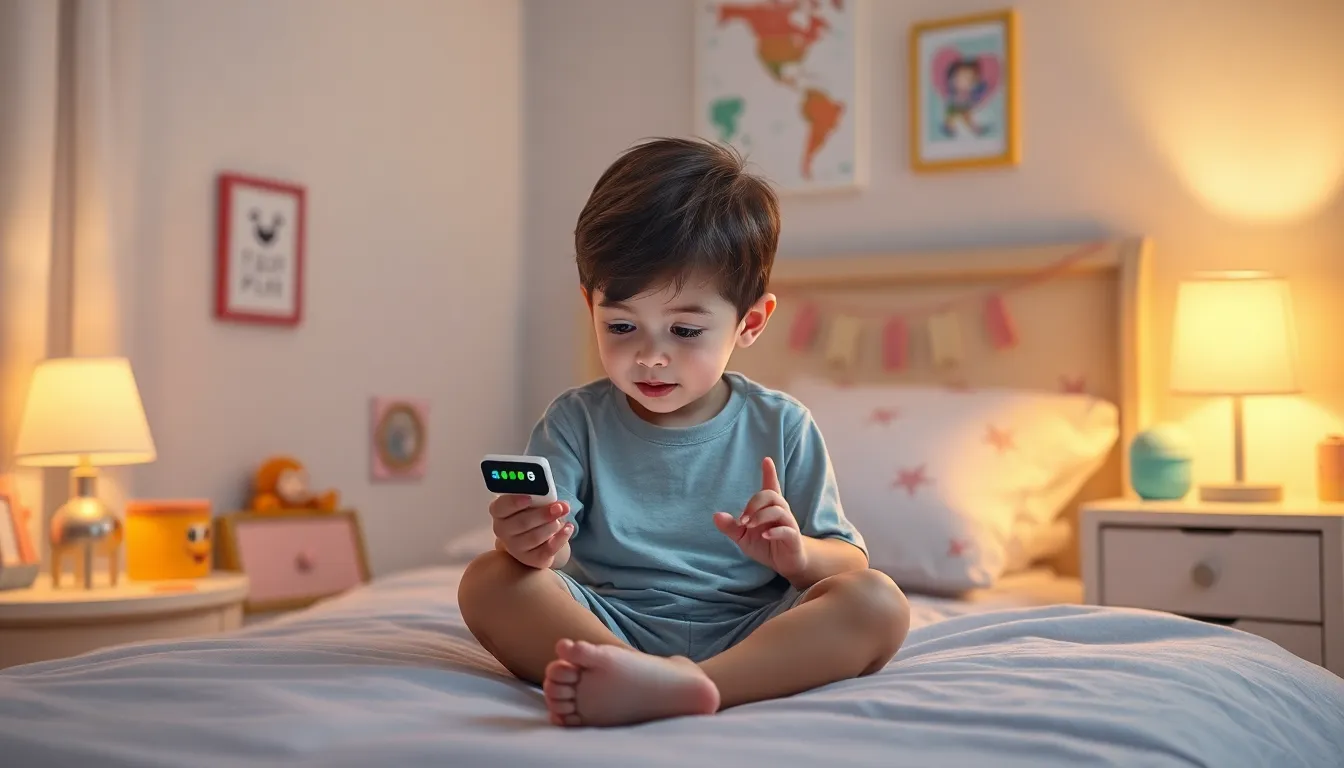In a world where bedtime battles are as common as cookie crumbs on the floor, a sleep tracker for kids might just be the secret weapon every parent needs. Imagine a device that not only monitors your child’s sleep patterns but also turns those nightly struggles into a fun game. With the right sleep tracker, kids can become little sleep champions, earning rewards for snoozing like pros.
These clever gadgets do more than just count sheep; they provide insights that can help parents understand what makes their little ones tick—or rather, sleep. So, if you’re tired of the nightly negotiations over bedtime, it’s time to explore how a sleep tracker can turn your household into a peaceful haven of dreams. After all, who wouldn’t want to trade in the chaos for a more restful night?
Sleep Trackers For Kids
Sleep trackers designed for kids monitor sleep quality and duration, offering insights that help improve bedtime routines. These devices provide data on sleep stages, including light sleep and deep sleep, which aids in understanding individual sleep patterns. Many models include features like bedtime reminders, encouraging children to develop a healthy sleep schedule.
Parents can access real-time data through mobile apps, allowing them to track their child’s progress over time. Additionally, many sleep trackers use gamification, making sleep habits fun. Kids can earn points or rewards for adhering to a consistent sleep schedule, promoting engagement and enthusiasm.
Some trackers come with customizable sleep goals, enabling parents to set specific targets tailored to their child’s needs. Voice alarms wake children gently, helping them rise without disruptive sounds. Sleep analytics often include insights into restlessness or wakefulness during the night, highlighting areas for improvement.
With the growing range of options available, it’s essential to consider age-appropriate features. For instance, some trackers are designed specifically for younger children, offering colorful designs and simple interfaces. Conversely, models for older kids may offer advanced features like sleep coaching or integration with other health apps.
Ultimately, sleep trackers for kids serve as valuable tools for parents wishing to promote better sleep habits. By gathering data and providing feedback, these devices help families create a more restful environment. The potential benefits manifest as improved sleep quality, healthier routines, and reduced bedtime struggles.
Importance Of Sleep Tracking

Sleep tracking plays a crucial role in promoting healthy sleep habits for kids. By monitoring sleep patterns, parents gain insights into their child’s sleep quality and duration, aiding in the creation of effective bedtime routines.
Benefits Of Monitoring Sleep Patterns
Monitoring sleep patterns provides valuable data on sleep cycles, helping identify areas that require improvement. Structured insights guide parents in establishing bedtime routines that maximize restorative sleep. Awareness of sleep quality can alert parents to potential sleep disorders, allowing timely interventions. Enhanced sleep knowledge benefits both parents and children by fostering better sleep hygiene. Engaging with sleep trackers encourages children to take ownership of their rest, making bedtime a more cooperative experience.
Impact On Child Development
Child development greatly benefits from adequate sleep, which supports growth and cognitive function. Sleep trackers enable parents to observe trends that correlate with mood changes and academic performance. Improved sleep often leads to better focus in school, emotional regulation, and overall behavior. Regular monitoring helps families adjust a child’s schedule, ensuring they receive the recommended 9 to 12 hours of sleep per night. By promoting positive sleep experiences, parents can facilitate healthier developmental milestones, reinforcing the importance of balanced sleep habits.
Types Of Sleep Trackers Available
Sleep trackers for kids come in various forms, each offering unique features tailored to monitor and improve sleep habits.
Wearable Devices
Wearable devices include smartwatches and fitness bands designed for children. These gadgets utilize sensors to track sleep stages, including light and deep sleep. Kids can wear them comfortably during the night without disruption. Many wearable devices also feature alarms that wake children gently, encouraging a smoother transition into the morning. Options often include activity tracking, giving parents a comprehensive view of their child’s health. Some models gamify sleep tracking, offering rewards for maintaining sleep goals. Parents can easily access real-time data through companion apps, aiding in evaluating sleep patterns and duration.
Smartphone Applications
Smartphone applications provide a modern solution for monitoring sleep. These apps often use the phone’s sensors to track sleep quality and patterns without needing additional devices. Users can set customized sleep goals and receive reminders for bedtime, reinforcing healthy routines. Many apps offer educational resources, helping kids understand the importance of sleep. Some applications incorporate gamification, turning sleep achievements into fun challenges. Data visualization features help parents quickly interpret trends in their child’s sleep habits. Smartphone applications create a convenient way to engage with sleep tracking, offering insights that support a healthy sleep environment.
Key Features To Look For
When selecting a sleep tracker for kids, prioritize features that ensure effectiveness and ease of use.
Accuracy And Reliability
Data accuracy significantly impacts the quality of sleep tracking. Look for trackers that provide precise measurements of sleep duration and quality, including light and deep sleep cycles. High-quality sensors enhance reliability, enabling parents to trust the information gathered. Reviews and user feedback often highlight how well devices perform in real-world situations, offering insights into their accuracy. Additionally, brands that utilize medical-grade technology may deliver more trustworthy results, ensuring parents receive reliable data to monitor sleep patterns.
User-Friendly Interface
A straightforward interface simplifies interactions with sleep trackers. Users can quickly navigate features and access data without frustration. Child-friendly designs encourage engagement, making it easier for kids to understand their sleep habits. Look for devices that utilize vibrant visuals, such as colorful graphs or icons, to display information. Apps that offer intuitive controls enhance the overall experience, allowing parents to set goals and reminders effortlessly. A user-friendly layout can lead to a more enjoyable and effective sleep-tracking experience for both children and parents.
Recommendations And Reviews
Multiple sleep trackers serve as effective tools for promoting better sleep habits in kids. Here are some top choices that stand out.
Top Sleep Trackers For Kids
- Fitbit Ace 3: This wearable device features activity tracking and sleep monitoring, encouraging kids to meet daily movement goals while gamifying their sleep experience.
- Garmin vívofit Jr. 3: This tracker integrates fun themes and challenges. Parents can customize sleep goals that align with kids’ preferences.
- Moshi Twilight Sleep Tracker: This non-wearable option focuses on sleep quality through audio tracks, promoting relaxation and encouraging children to unwind before bedtime.
Comparison Of Features And Pricing
| Tracker | Key Features | Price Range |
|---|---|---|
| Fitbit Ace 3 | Activity tracking, sleep insights, motivating rewards | $80 – $100 |
| Garmin vívofit Jr. 3 | Fun themes, customizable sleep goals | $70 – $100 |
| Moshi Twilight Sleep Tracker | Audio relaxation, non-wearable convenience | $30 – $50 |
Pricing varies based on features and brand. Each option provides unique strengths, and parents should consider their child’s age and engagement level while selecting.
Conclusion
Sleep trackers for kids offer a practical solution to the challenges of bedtime routines. By providing insights into sleep patterns and gamifying the experience, these devices empower children to develop healthier sleep habits. Parents can monitor their child’s sleep quality and duration, leading to improved focus and emotional regulation.
Choosing the right sleep tracker involves considering features that suit a child’s age and needs. With options ranging from wearable devices to smartphone apps, families can find the perfect fit to enhance their child’s sleep health. Ultimately, investing in a sleep tracker can transform nighttime struggles into a peaceful and rewarding experience for both kids and parents.

